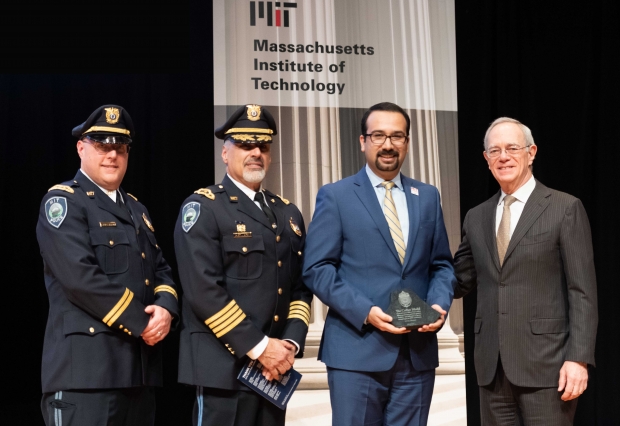PhD candidate Arman Rezaee recognized for creating an environment of compassion and support

Collier Medal presentation (L to R): MIT Police Captain Craig Martin, Arman Rezaee, MIT Police Chief John DiFava, MIT President L. Rafael Reif
Editor’s Note: This article has been updated to include details from the March 25 award ceremony.
By Anne Stuart | EECS Staff
EECS PhD candidate Arman Rezaee has been named as the 2019 winner of MIT’s Collier Medal, which celebrates an individual or group whose actions demonstrate the importance of community.
Rezaee was selected in recognition of his many efforts to help a wide variety of people at MIT, particularly through EECS Resources for Easing Friction and Stress (REFS), a graduate-student volunteer group whose members serve as coaches, mediators, liaisons, and sometimes just listeners for their peers. “Arman has committed multiple years to this work,” the EECS REFS members wrote in nominating Rezaee for the honor. “Students who have sought his advice attest to his thoughtful approach and friendly demeanor, qualities that are essential during difficult conversations.”
The honor also acknowledges Rezaee’s work as a graduate resident tutor (GRT) for about 25 students in iHouse, an undergraduate living-learning community in the New House residence hall. Rezaee “inherited a fractured group of undergraduates in 2015,” Wesley L. Harris, Charles Stark Draper Professor of Aeronautics and Astronautics and head of New House, recalled in his nomination letter. “With care, insight, and timeless energy, he transformed the community into an active, focused and committed community of living-learning scholars.” Harris added: “iHouse is now the MIT standard for a living-learning community.”
From Iran to Arizona to MIT
Vincent W.S. Chan, the Joan and Irwin Jacobs Professor in EECS, attributed Rezaee’s approach to his life experience. Born in Iran, Rezaee was accepted as a youngster to a school for gifted students, but was later expelled due to his religious beliefs, namely growing up as a Baha’i. Rezaee left his homeland and, with the help of an international organization, received asylum in the United States. He finished high school in Arizona and graduated from Arizona State University before coming to MIT.
“Equipped with such an outlook on life, he has been able to create an atmosphere of compassion and support that is conducive to a welcoming atmosphere around him in the living group he tutors and mentors and also [in] my own research group,” wrote Chan, who is Rezaee’s PhD advisor and a member of the Claude E. Shannon Communication and Networking Group in RLE. “He makes dark and bleak situations more tolerable with his calm and warm support of those afflicted.”
As just one example, Chan described Rezaee’s efforts to support the iHouse undergraduates during the chaotic presidential election of 2016. “He stayed up all night with the students and counseled those in distress.” On other occasions, he has accompanied students for treatment at the medical center or Massachusetts General Hospital, Chan wrote. “Those little incidents may seem trivial now, but I am sure the students will recall later in life that someone showed them he cared during some dark moments in their lives.” Since then, Chan continued, Rezaee has continued helping students in crisis find the resources they need: “His sensitivity to human issues has helped prevent several students from sinking deeper into depression.”
Academic and research achievements
While praising Rezaee’s civic accomplishments, Chan emphasized that his student is an outstanding scholar and researcher as well. His research interests span communication systems and data networks, with an emphasis on cognitive network management and control. “He’s one of our best students,” Chan said in an interview.
Rezaee started his graduate studies at MIT in 2009 with the support of an Irwin and Joan Jacobs Presidential Fellowship. He did his master’s thesis under the supervision of Muriel Medard, the Cecil H. Green Professor of Electrical Engineering and Computer Science, in the Network Coding and Reliable Communications Group in RLE. During that time, he collaborated with researchers at Lincoln Lab to develop a predictive model and protocol enabling scalable multicast sessions over long latency channels. His research findings were highlighted at multiple conferences, published in an IEEE journal, and provided the central theme for two patents. The prestigious IEEE Transactions on Cognitive Communications and Networking has invited him to submit a paper for an upcoming special issue, and the MIT Technology Licensing Office has filed a patent for his most recent work. (Rezaee also worked for three years after earning his master’s degree to help pay for his mother’s cancer treatment in Iran, returning to MIT after she passed away.)
Rezaee himself said that while he was thrilled to be selected for the Collier Medal, he could hardly believe it. “I keep thinking they’re going to call and say they made a mistake,” he said.
The Collier Medal honors the memory of MIT Officer Sean Collier, shot and killed on campus during the massive area-wide manhunt for suspects in the Boston Marathon bombing in April 2013. Rezaee received the honor during the annual MIT Excellence Awards + Collier Medal ceremony on March 21. For coverage of the ceremony, visit the MIT News website.
Media Inquiries
Journalists seeking information about EECS, or interviews with EECS faculty members, should email eecs-communications@mit.edu.
Please note: The EECS Communications Office only handles media inquiries related to MIT’s Department of Electrical Engineering & Computer Science. Please visit other school, department, laboratory, or center websites to locate their dedicated media-relations teams.